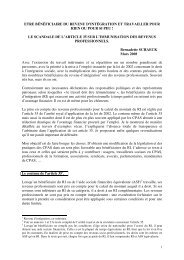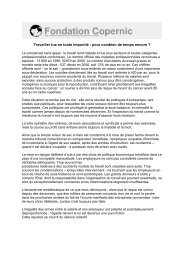Awra Amba RJ 300612 EN - Contacter un comité local d'Attac
Awra Amba RJ 300612 EN - Contacter un comité local d'Attac
Awra Amba RJ 300612 EN - Contacter un comité local d'Attac
You also want an ePaper? Increase the reach of your titles
YUMPU automatically turns print PDFs into web optimized ePapers that Google loves.
3. Values and principles<br />
Any society has a system of values – a set of ideas, concepts and behaviours in relation – to which it<br />
is strongly committed. The term of culture refers rather to a set of knowledge allowing individuals<br />
and groups to assert and interpret the values, beliefs, customs and behaviours, which distinguish<br />
them from other groups or societies (Ndura, 2004/10). The values or the culture of a society are<br />
never <strong>un</strong>changing, but evolve over generations, especially to adapt to a new environment.<br />
Yassin (2008/78) considers the Ethiopian society rigid and few open to new ideas and new<br />
behaviours likely enriching it. For <strong>Awra</strong> <strong>Amba</strong>, the Amhara rural society is static and does not leave<br />
any freedom to individuals whose role is defined very precisely, while the freedom of each<br />
individual enriches all (Ya08/69-70).<br />
<strong>Awra</strong> <strong>Amba</strong> is a village strongly <strong>un</strong>ited by a culture and ideals, which make them very different from<br />
the Amhara society and the surro<strong>un</strong>ding villages. It is firstly a comm<strong>un</strong>ity sharing values: to live in<br />
<strong>Awra</strong> <strong>Amba</strong> means to share and to defend these values (At05/48). The comm<strong>un</strong>ity does recognise<br />
explicitly the notion of value, considered as a rule, an idea, a standard, or a guiding principle in life<br />
(Ya08/83). Thus, to be allowed to be member of the comm<strong>un</strong>ity, one must complete a probationary<br />
observation period and respect an ethic and a life style fully in agreement with the values and<br />
principles of the comm<strong>un</strong>ity (Crespo, 2011).<br />
The comm<strong>un</strong>ity members feel themselves different from other and better, because of a determination<br />
to build a new life (At05/58); according to their parents, the children have a high opinion of<br />
themselves and of their own ability to improve their situation. They are always asked to come with<br />
new ideas and to make concrete proposals, to learn only reading and writing being considered a<br />
waste of time (Ya08/76 & 92).<br />
Prestige is acquired by who works consciously and applies in daily life the values of the comm<strong>un</strong>ity.<br />
The daily behaviour is therefore the criterion of each one's status (At05/9).<br />
Atnafu (2005/57-58), Yassin (2008/83) and Mekonnen (2009/5) address each first of all the <strong>Awra</strong><br />
<strong>Amba</strong> values in a specific section: the list is given in Table 2. These three attempts to structure the<br />
comm<strong>un</strong>ity values are not very coherent between them. We tried, however, to synthesize them into<br />
four main values: honesty, solidarity (or brotherhood), human rights (or equality), and reason<br />
reduced to refusal of dependence (or addiction) and of festivities.<br />
Furthermore, all authors list comm<strong>un</strong>ity values along their texts, which is much richer than the above<br />
structuring attempts. For a better <strong>un</strong>derstanding of these values, it is useful to look at the questions of<br />
the fo<strong>un</strong>der when he was teenager, as reported by Ya08/65 & 78:<br />
- Why don’t women have rights to choose their partners as men do?<br />
- Why don’t women equally participate and decide on issues that concern their family and their<br />
life?<br />
- Why don’t women have equal access to education, health and other opport<strong>un</strong>ities?<br />
- Why don’t mothers get proper respect?<br />
- Why are people creating differences in religion by giving different names to God while God<br />
is one irrespective of names given to him by different languages?<br />
- Why are people considering differences of colour among human beings while we are of the<br />
same stock and the difference is the same as difference between white and black cats?<br />
- Why are ostracized skin scraper, weavers, and blacksmiths, amongst other, regardless of the<br />
importance of their professions?<br />
33 /85

















